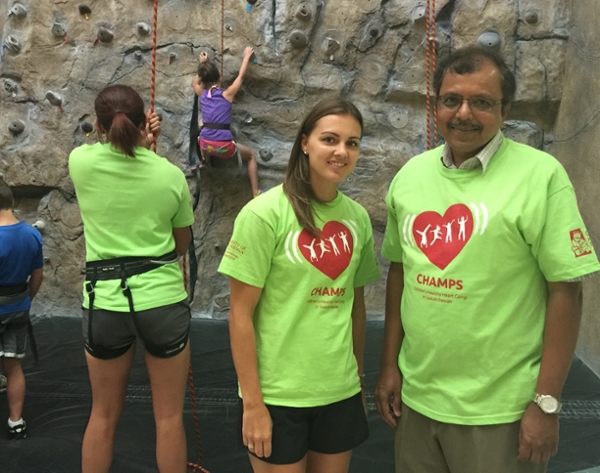
CHAMPS camp gives patients confidence to have fun
CHAMPS has brought together children who have had heart surgery from across the province to provide them with the opportunity to do something they may never have felt comfortable doing otherwise: playing the way other kids their age get to without fear.
By Marg SheridanEvery summer the University of Saskatchewan campus becomes home to a vast collection of day camps for Saskatoon children enjoying their two-month hiatus from school - the Bowl becomes sport-central, with dozens of kids playing hard with carefree abandon.
But last week, just around the corner from the Bowl, there was a smaller group of children gathered for a summer camp believed to be the first of its kind North America – a pediatric chronic disease management program for children with cardiac conditions.
CHAMPS - Children's Healthy Heart Camp in Saskatchewan has brought together children who have had heart surgery from across the province to provide them with the opportunity to do something they may never have felt comfortable doing otherwise: playing the way other kids their age get to without fear.
“Most of the kids here have major heart problems,” explained Dr. Ashok Kakadekar, a clinical associate professor in pediatric cardiology with the CoM. “And they can do pretty much anything – except for one kid who said he can’t lift heavy things like Arnold Schwarzenegger does – but otherwise they can do anything.”
The camp gives them an environment where they can not only be monitored, but one that hopes to allow them to learn that their ability to play sports, or participate in physically demanding activities, isn’t as limited as they may have thought it was.
“There are a lot of families who are hesitant to get their children active because they’re afraid for their heart,” Kakadekar continued. “But the children are worried as well because they don’t see their peers doing anything, and they’re protected in this bubble.
“We need to get them out if it.”
The week-long camp not only encourages the children to take part in physical activities like swimming and scaling the rock wall, but it has given them the opportunity to speak with doctors, psychologists, and even athletes.
“There’s a very established cardiac rehabilitation program for adults, but there’s nothing for these children,” said Dr. Marta Erlandson, the principal investigator involved with the camp from the College of Kinesiology. “There’s a physical activity component, so each day we’re doing different physical activities where our goal is to give them the skills that they can then take back with them to physical education classes to help them feel comfortable and able to interact with their friends.”
These classes come not only in the form of the aforementioned climbing and swimming, but in lessons from Huskies athletes on subjects from how to dribble a basketball to learning to throw a football.
The camp also includes classes on nutrition lead by registered dieticians and PhD students from the College of Pharmacy and Nutrition teaching the children about healthy eating and how it positively affects their heart, as well as the opportunity to work with clinical child psychologists from the University of Regina who are helping the children learn how to both recognize and manage anxiety.
In addition to the nutrition and emotional support, a group of pediatric residents from the CoM are giving the children the opportunity to sit down and learn specifically about their heart – how the surgery they have received has changed how their heart functions. The team is hoping that in learning more about their particular disorder, the children may be more open to asking their doctors questions they may not have felt comfortable asking in a hospital setting.
“Another thing we hoped for, and that we’re seeing, is that they develop a peer group,” Erlandson continued. “When we went into the pool they all saw that they each had scars and were surprised to see that this is normal - that they weren’t the only one.
“So they were comparing them to see what they looked like and were creating a really good peer group that if they’re having another surgery they may have now met someone who went through that.”
While the confidence and education provided to this group of children is important, the camp plays an even larger role in terms of pediatric cardiac research.
“There’s very little information out there about children with cardiac conditions,” Erlandson explained.
So the team did some pre-camp testing on the children to help determine their starting physical activity levels which they will compare not only to the post-camp results, but to a control group of their peers. This research can then, Kakadekar and Erlandson hope, be put towards creating a sustainable program that they can continue.
“That’s the main goal,” Kakadekar said. “As a clinician we only look after the heart – we fix the heart and they’re out. We don’t do the rest of this because we don’t have the support to do it, so this has been an eye-opener for us. This group is a big asset to these kids.”
The camp, which was funded by a research grant from the Children’s Hospital Foundation of Saskatchewan, has the potential of helping to change thousands of lives in the province.
"This pilot project is a critical first-step towards developing a provincial program for children with congenital heart disease," says Brynn Boback-Lane, President & CEO, Children's Hospital Foundation of Saskatchewan. "Our mission is to advance the health of children in Saskatchewan. The research that comes from this project will allow pediatric specialists to pilot new, innovative programming tailored to the health concerns of the 2,000 children living with congenital heart defects in our province."
“This is important,” Kakadekar stressed. “It’s not just a camp.”
